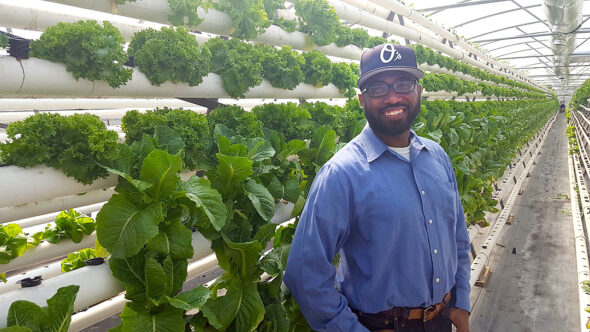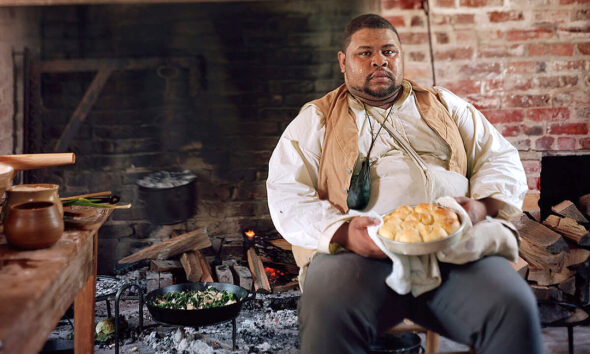
The Rev. Dr. Heber Brown of The Black Church Food Security Network is a featured keynote speaker at Agraria’s third annual Black Farming Conference, Friday and Saturday, Sept. 9 and 10. (Submitted photo)
Black Farming Conference slated
- Published: September 8, 2022
“Our roots are Africa but our lands are America.” — Cheryl Smith
“Roots, Food and Storytelling” is the theme for the Agraria Center for Regenerative Practice’s third annual Black Farming Conference planned for Friday, Sept. 9, and Saturday, Sept. 10.
The conference is free and open to the public. Partnering with Central State University and the National Afro-American Museum and Cultural Center in Wilberforce, this year’s conference will see a return of more in-person activities. According to conference planning committee chair Ariella Brown, the COVID-19 pandemic forced two previous conferences to be mostly online. Brown said one positive outcome of pivoting to a virtual conference is that the conference drew a national audience.
“For the past two years, 95 percent of conference content was solely online because of the pandemic,” she said.
The committee organizers comprise Brown, who works with Hall Hunger Initiative, a nonprofit with the University of Dayton that focuses on hunger issues, and serves part-time as the director of BIPOC Strategic Initiatives at Agraria; Antioch professor and historian Kevin McGruder, who conceived the idea of the conference; and activist and writer, Cheryl Smith.
Brown, a Dayton transplant from Cleveland, worked for former Ohio congresswoman and current Housing and Urban Development, or HUD, secretary Marcia Fudge under the Biden administration. According to Brown, her time working as an agriculture staffer in Fudge’s district office increased her awareness of the importance of agriculture initiatives, resources and policy direction, including to the government food program SNAP, or Supplemental Nutrition Assistance Program. SNAP provides monetary benefits for food to low-income families, seniors and people with disabilities.
“I really took an interest in agriculture and the diversity of agriculture as it relates to different sectors. It is a huge economic driver for the state of Ohio,” she said.
One goal of the conference, according to the Black Farming Conference website, is “building upon the legacy of our ancestral roots of food from the African diaspora and the power of storytelling through food, family, and American culture.” To support the effort, two nationally recognized keynote speakers will address conference attendees virtually.
The Rev. Dr. Heber Brown will speak on Friday at 7 p.m. Brown is pastor of Pleasant Hope Baptist Church in Baltimore, Md. A community organizer and emerging farmer, Brown developed The Black Church Food Security Network whose purpose is to increase “food security and food sovereignty by co-creating Black food ecosystems anchored by Black congregations in partnership with Black farmers.” Brown is working on a book that, in part, explores the history of Black faith-based food sovereignty.

Educator and “culinary historian” Michael Twitty is also a featured keynote speaker at the conference. (Submitted photo)
Writer, educator and “culinary historian” Michael Twitty will address the conference on Saturday at 1 pm. Twitty is the winner of the 2018 James Beard Foundation Book Award for Book of the Year award for his book “The Cooking Gene.” Twitty also appeared in the 2021 Netflix documentary “High on the Hog: How African American Cuisine Transformed America.”
Organizer Brown said that, in establishing the yearly conference’s historical theme, it was important to find participants who can “translate the message.”
“[Twitty] is especially recognized for his knowledge, the breadth and depth of the history of culinary arts around the African diaspora,” she said.
According to Brown, the conference organizers also sought to expand the audience by inviting participation from the faith-based community to learn more about the role of the Food Security Network.
“A lot of faith-based organizations have access to land and do more than just send a message on Sunday. … Someone who has a church and has land may want to start community gardens,” she said.
Brown said the partnership with Central State was an intentional choice. The university is one of 19 historically Black colleges and universities, or HBCUs 1890 Land Grant Institutions. These institutions “strengthen research, extension and teaching in the food and agricultural sciences, and attract more students into careers in agriculture, food, natural resources, and human sciences,” according to the USDA website.
This year’s conference will see an increase of in-person networking opportunities and events on Friday Sept. 9, from noon until 4 p.m., with workshops and tours planned on Central State’s campus. Exhibits at the museum will be open to the public. Vendors and food trucks will also be on hand, and a farmers market organized by Agraria’s Regenerative Farmers Fellows will be set up outside the National Afro-American Museum and Cultural Center. The six fellows are “mostly Black, Indigenous, or People of Color” in rural and urban communities in Greene, Montgomery and Clark counties. They are part of a pilot training program launched in May in partnership with The Nature Conservancy and Central State University that teaches best practices related to farming.
Rounding out the conference on Saturday are virtual breakout sessions on topics ranging from business discussions about farm credit worthiness led by Marcus Taylor, to a presentation on insurance liability pitfalls from Matt Ludwig. Sessions about reclaiming the legacy of Black farming traditions from Khadejah Scott and a storytelling workshop by Omope Carter Daboiku, Agraria’s first artist in residence, are also on the program.
According to Brown, although the conference is centered around Black farming contributions, it is an opportunity for everyone to learn about the history of Black farming.
“We are not discriminating; the conference is open to anyone who wants to attend. …We are always looking for more partners and people who want to support the programs at Agraria beyond Black farming conferences,” she said.
Citing the average age of a farmer in the United States, Brown wants future conferences to engage with young people who may want to consider farming.
“The average age of a farmer is 60,” she said.
For registration information, visit the conference website at community.agrariacenter.org/e/black-farming-conference-roots-food-storytelling
The Yellow Springs News encourages respectful discussion of this article.
You must login to post a comment.
Don't have a login? Register for a free YSNews.com account.











No comments yet for this article.